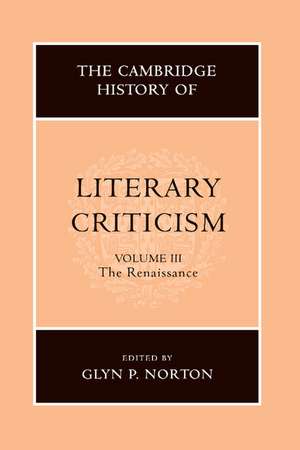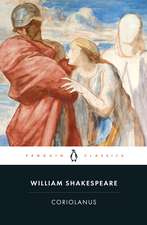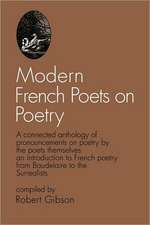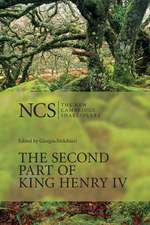The Cambridge History of Literary Criticism: Volume 3, The Renaissance: The Cambridge History of Literary Criticism, cartea 3
Editat de Glyn P. Nortonen Limba Engleză Paperback – 5 iul 2006
Preț: 443.35 lei
Preț vechi: 547.34 lei
-19% Nou
Puncte Express: 665
Preț estimativ în valută:
84.84€ • 88.76$ • 70.47£
84.84€ • 88.76$ • 70.47£
Carte tipărită la comandă
Livrare economică 02-16 aprilie
Preluare comenzi: 021 569.72.76
Specificații
ISBN-13: 9780521317191
ISBN-10: 0521317193
Pagini: 786
Dimensiuni: 157 x 225 x 39 mm
Greutate: 1.05 kg
Ediția:Pbk.
Editura: Cambridge University Press
Colecția Cambridge University Press
Seria The Cambridge History of Literary Criticism
Locul publicării:Cambridge, United Kingdom
ISBN-10: 0521317193
Pagini: 786
Dimensiuni: 157 x 225 x 39 mm
Greutate: 1.05 kg
Ediția:Pbk.
Editura: Cambridge University Press
Colecția Cambridge University Press
Seria The Cambridge History of Literary Criticism
Locul publicării:Cambridge, United Kingdom
Cuprins
Introduction; Part I. Reading and Interpretation: An Emerging Discourse of Poetics: 1. Theories of language; 2. Renaissance exegesis; 3. Evangelism and Erasmus; 4. The assimilation of Aristotle's Poetics in sixteenth-century Italy; 5. Horace in the sixteenth century: commentators into critics; 6. Cicero and Quintilian; Part II. Poetics: 7. Humanist classifications of poetry among the arts and sciences; 8. Theories of poetry: Latin writers; 9. Literary imitation in the sixteenth century: writers and readers, Latin and French; 10. Petrarchan poetics; 11. Translatio and translation in the Renaissance: from France to Italy; 12. Invention; 13. Humanist education; 14. Second rhetoric and the grands rhetoriqueurs; 15. The rhetoric of presence: art, literature, and illusion; 16. The paradoxical sisterhood: 'ut pictura poesis'; 17. Conceptions of style; 18. Sir Philip Sidney's An apology for poetry; 19. Aristotle, Horace, and Longinus: the conception of reader response; 20. Italian epic theory; 21. The lyric; 22. Renaissance theatre and the theory of tragedy; 23. Elizabethan theatrical genres and literary theory; 24. Defining comedy in the seventeenth century: moral sense and theatrical sensibility; 25. Dialogue and discussion in the Renaissance; 26. The essay as criticism; 27. The genres of epigram and emblem; 28. Humour and satire in the Renaissance; Part III. Theories of Prose Fiction: 29. Theories of prose fiction in England: 1558–1700; 30. Theories of prose fiction in sixteenth-century France; 31. Seventeenth-century theories of the novel in France: writing and reading the truth; 32. Theories of prose fiction and poetics in Italy: novella and romanzo (1525–96); Part IV. Contexts of Criticism: 33. Criticism and the metropolis: Tudor-Stuart London; 34. Criticism in the city: Lyons and Paris; 35. Culture, imperialism, and humanist criticism in the Italian city-states; 36. German-speaking centres and institutions; 37. Courts and patronage; 38. Rooms of their own: literary salons in seventeenth-century France; 39. Renaissance printing and the book trade; Part V. Voices of Dissent: 40. The Ciceronian controversy; 41. Reorganizing the encyclopedia: Vives and Ramus on Aristotle and the scholastics; 42. The rise of the vernaculars; 43. Ancients and Moderns: France; 44. Women as auctores in early modern Europe; Part VI. Structures of Thought: 45. Renaissance Neoplatonism; 46. Cosmography and poetics; 47. Natural philosophy and the 'new science'; 48. Stoicism and Epicureanism: philosophical revival and literary repercussions; 49. Calvinism and post-Tridentine developments; 50. Port-Royal and Jansenism; Part VII. Neoclassical Issues - Beauty, Judgement, Persuasion, Polemics: 51. Combative criticism: Jonson, Milton, and classical literary criticism in England; 52. The rhetorical ideal in seventeenth-century France; 53. Cartesian aesthetics; 54. Principles of judgement: probability, decorum, taste, and the je ne sais quoi; 55. Longinus and the Sublime; Part VIII. Survey of National Developments: 56. Seventeenth-century English literary criticism: classical values, Engish texts and contents; 57. French criticism in the seventeenth century; 58. Literary critical developments in sixteenth- and seventeenth-century Italy; 59. Cultural commentary in seventeenth-century Spain: literary theory and textual practice; 60. The German-speaking countries; 61. The Low Countries; Bibliography; Index.
Recenzii
'… its huge and impressive range and scope make its arrival an occasion for great rejoicing … Norton's anthology makes a permanent contribution, not least because it alerts us to how criticism is now, not just to how it was then.' Valentine Cunningham, The Times Higher Education Supplement
'…it will prove to be an invaluable resource for scholars of the early modern period, and will doubtless become a standard work of reference.' Scott Nixon, Review of English Studies
'…it will prove to be an invaluable resource for scholars of the early modern period, and will doubtless become a standard work of reference.' Scott Nixon, Review of English Studies
Descriere
This 1999 volume is the standard work of reference on early modern literary criticism in Europe.





















